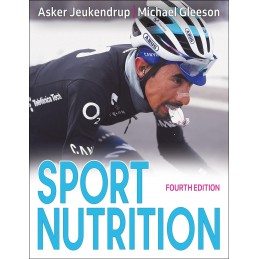For students planning to work in a sport- or exercise-related career, it is crucial to understand the essential role nutrition plays in health, adaptations to physical activity and exercise, weight maintenance, and sports and exercise performance.
Sport Nutrition, Fourth Edition With HK Propel Access, presents the principles and rationale for current nutrition guidelines for athletes and provides an in-depth look at the science behind sport nutrition.
Using a physiological basis,
Sport Nutrition aims to explain the role of nutrition in enhancing exercise performance. It moves from general principles of nutrition and nutrient requirements to estimating and fulfilling energy needs with the appropriate combinations of macronutrients and micronutrients. Supplements are addressed from a scientific standpoint, followed by the influence of nutrition on training adaptations, body composition, weight management, and eating disorders. Information on personalized nutrition covers periodized nutrition, sex differences, and special populations (young athletes, older athletes, and diabetic athletes) and offers practical examples from specific sports.
The fourth edition is greatly enhanced with a new full-color format showcasing 40 new infographics and 50 additional figures and illustrations. These visual elements provide a more engaging experience, allowing students to fully comprehend important concepts, methods, and research findings. This edition features online access to references, appendixes, and glossary terms and definitions, providing useful explanations and at-a-glance information. New topics in this edition include the following::
- How to recognize good versus bad information about sport nutrition
- The role of gut microbiota and how this microbiome is affected by diet and exercise
- The function of macronutrients and micronutrients in relation to exercise performance and recovery
- Guidelines to limit gastrointestinal problems during exercise
- Electrolyte replacement during exercise in the heat
- The effects of exercise and nutrition on immune function and health outcomes, as learned from the COVID-19 pandemic
- Low energy availability and the causes and consequences of relative energy deficiency in sport (REDs)
More than a simple prescription of recommendations,
Sport Nutrition, Fourth Edition, offers a systematic presentation of the science supporting current nutrition guidelines. It is an ideal book to provide a comprehensive understanding of nutrition as it relates to sport, exercise performance, training, and recovery.
Note:: A code for accessing HK
Propel is included with all print books.


 Dostawa
Dostawa
 Płatność
Płatność
 Zwroty
Zwroty
